Far Away Eyes’ Deeper Look: “Supernatural” 10.22 “The Prisoner”
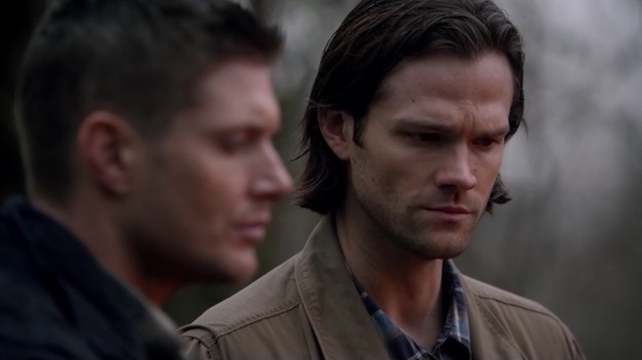
The words prison and prisoner invoke strong imagery.
We think of orange jump suits, chains, barred windows, and of guards. We think of doors slamming shut locked, trapping inmates inside. But there are other prisons than the physical correctional facilities we envision. “The Prisoner” blends the concept of physical and emotional prisons into a beautiful composition of the things that can trap us. At some point in each of our lives, we can all find ourselves trapped in a prison—sometimes of our own making—and how we can either choose to remain incarcerated or to break free. When prisons are being built or destroyed, be they physical or emotional, however, we need our family to be there for us—to be there “even when it hurts”—and even when it seems we may not want them there at all. This concept is explored in layers and in each character’s story—the Stynes, Crowley, Castiel, and the Winchesters themselves are all either being put into prisons, breaking free from prisons—and each of them have instances where family is or isn’t there for them “even when it hurts.”
Let’s start with the Styne family first.
For the Stynes, their prison is clearly that of their secrecy and discipline. Monroe Styne, the patriarch of this particular branch of the Stynes has declared that it is through these things that they’ve managed to exist without being detected. They’ve adhered to codes about leaving no witnesses behind and making certain that they never ever do something to garner the attention of the authorities or press. It is one reason why they are so adamant about pursuing Charlie for instance. Monroe is firm with this treaty on the family responsibilities, knowing that they must do so in order to continue the traditions of the family as it has gone on for generations both here in the New World and back over seas in the Old. It is this line of thinking, however, that is the prison that traps the Stynes.
They are so focused on executing their own goals and achieving their own plots that they seem to be rather unaware of anything outside their realm. If it doesn’t interfere with their plans to create chaos to profit from or doesn’t stop them from harvesting other people for their enhanced bodies, the Stynes do not pay it any mind. They seem rather unaware of the hunting world, of the Men of Letters—given by Eldon’s description of the Winchester “club house” and his surprise at it—or about the various struggles that have happened outside their own designs. In many ways, the Stynes are so outside of everything at this point, cut off due to that secrecy and discipline that they are made vulnerable to the likes of a grieving and angry Dean Winchester.
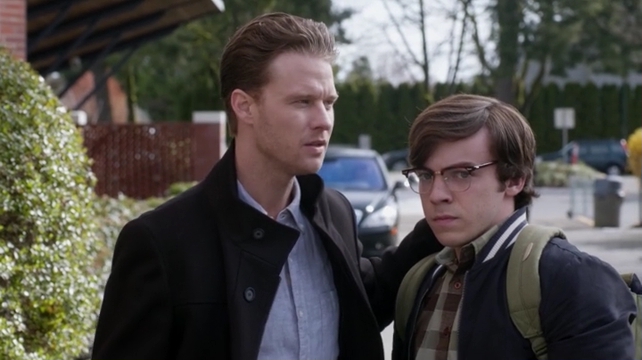
Along with that prison that they’ve clearly created for themselves, they, too, adhere to the adage of “even when it hurts” for standing with family. Removed as they are from most of the outside world, and while they may be considered powerful in their area, they are very close and protective of their own. This comes out clearly when Cyrus, the youngest Styne cousin, is attacked by a few bullies at his school. They are determined to rile him up, push him into a fight, and eventually beat him just for the hell of it. It seems likely that Cyrus will be black and blue before this is over, that is until another Styne—far more adept at being intimidating and deadly—interferes and stops the foolishness. The bully tells him that there’s nothing wrong, and Eli Styne retorts, “I wasn’t asking you, dickbag.”
Unfortunately this display of family solidarity is not as clear cut as it seems—or as familial as it appears. Cyrus, playing a video game with a friend, is pulled from his room to partake in his family’s true pursuits. The bully from earlier is put onto an operating table, and the Stynes are going to punish this young man for attacking their own. It is a twisted version of standing with your family and of protecting your own against a threat—and it comes with a terrible price for Cyrus that he does not want to pay but must. He is forced to do the surgery and carve this man’s arm off so it can be given to Eldon to replace the one he ripped off in his escape.
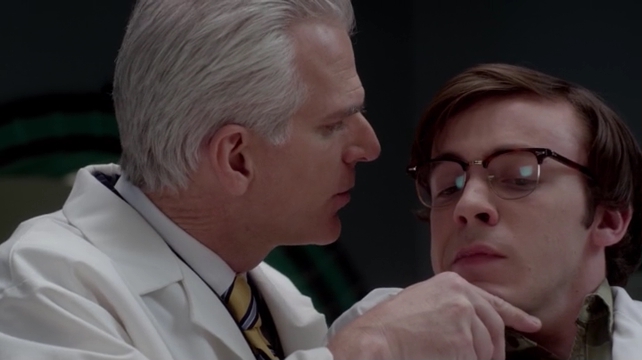
Cyrus, sadly, sees family in this case as his prison—and he’s not far off the mark in seeing and feeling that way about it. The Stynes are focused on their own agendas, and therefore their family has no room for any defections or soft hearted members. They’re determined to make Cyrus one of them—to further lock him inside the prison and to live up to the “even when it hurts” adage. Either he carves this young man and proves that he’s one of them, or he’ll be put on the table next, set as an example for those who do not adhere to the Styne traditions.
In this way, their standing with family “even when it hurts” fuels the prisons of discipline and secrecy that will lead to their ultimate destruction by episode end.
But what of the other characters? How does Rowena factor into this for instance?
Rowena, since she has agreed to work with Sam on translating the Book of the Damned, has been put into chains. Her place within the prison metaphor is one of the physical. She is his prisoner until she should give Sam what he needs in order to cure Dean of the Mark of Cain. She is chained in that room with iron, preventing her from using the magic she loves so much. And yet, it is far more than just simple physical and visual representation within the episode. It goes beyond simply making this a beat within the construct of the episode—or reflecting the other physical instances of restraints or imprisoning.
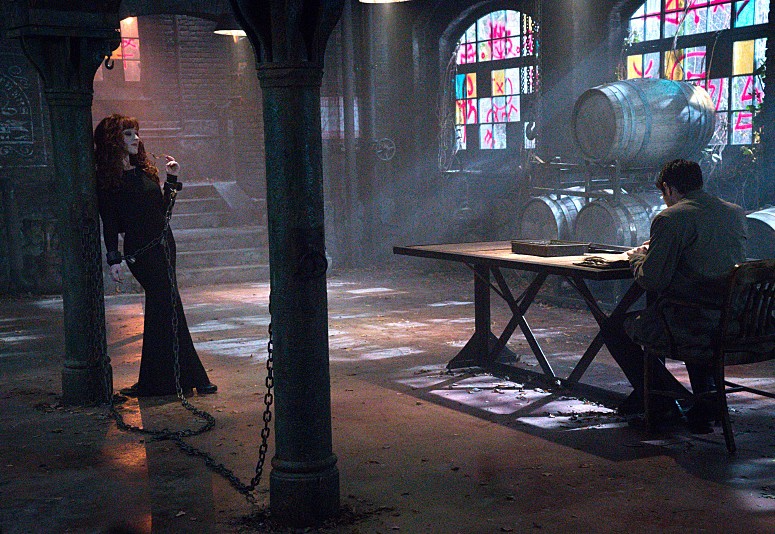
Rowena is trapped not just by the chains Sam has her locked into. She’s also trapped in a prison much of her own making. Her meddling with Crowley, and her attempts to push him to run Hell her way coupled with her infractions as his mother while he was still a child have put her into this precarious position. Each time she manipulated Crowley—usually to go against the Winchesters for her own means—has only further cemented that prison for her. For Rowena, she is under threat from him for as long as he continues to live. He won’t let her just simply be free and practice magic—or to pursue some of her other goals such as perhaps reviving and running the Grand Coven. Instead, he will always be that ax waiting to fall on her head at any given moment.
So she needs him removed. It’s part of her deal with Sam, after all. Rowena, much like her son, is no fool, though. She knows that she must put herself first if she is to break free from her prison—and “even when it hurts” need not apply to her feelings for her son. But simple survival isn’t enough to push her to force Sam’s hand into killing Crowley first, either. Rowena’s prison is that Crowley has hurt her. She may not care about him as much as a mother should, but his rejection has clearly cut her deeply and continues to do so. It’s why she’s so adamant he ought to die. She barks at Sam, “You will kill my son and you will do it my way now!” Rowena’s prison is that she wanted to be with her son, rule with him or through him, and instead she has been reduced to a witch on the run all over again, all from a new threat and enemy that she thought to never see again until recently.
But if Rowena was put in an emotional prison by Crowley’s rejection, we see Crowley’s prison clearly reflect hers in kind.
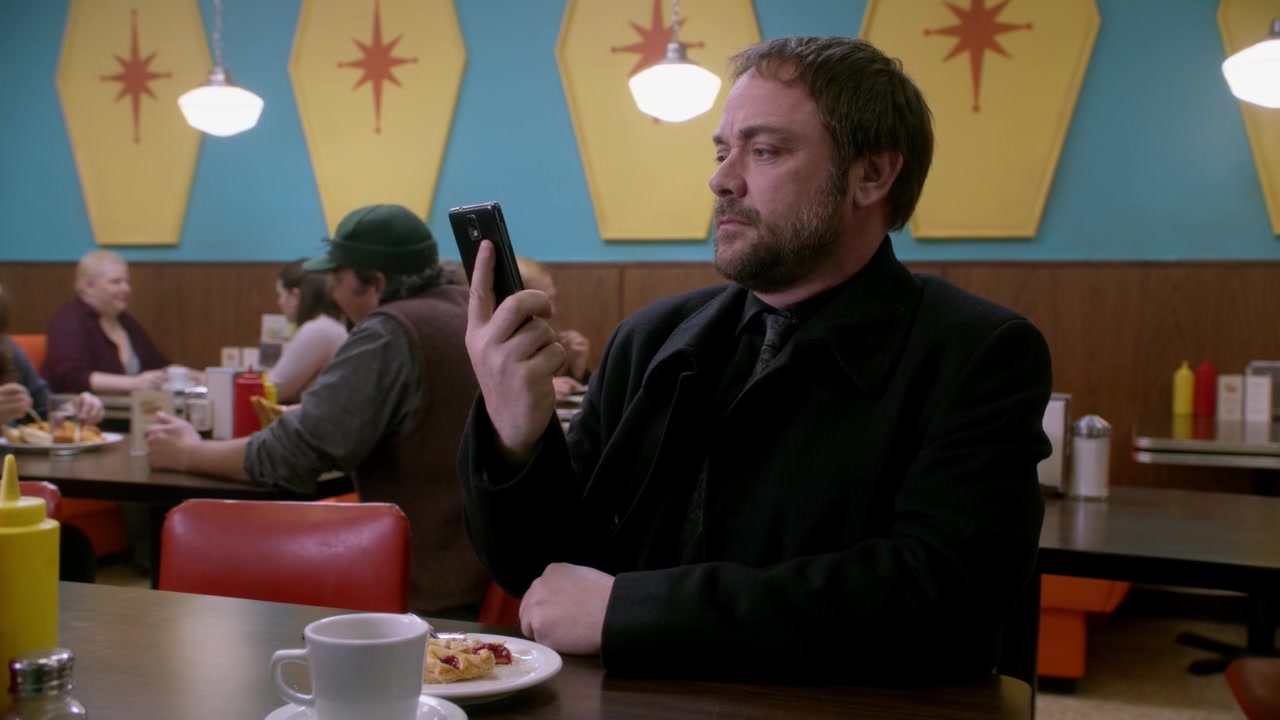
The King of Hell, confronted by Sam Winchester, is first tricked by a phone call from Dean. He believes that he’s there to help his “friend,” that he’s been called in to address something for the elder Winchester as a favor he may even get to use against him later, and deep down that he is truly needed by Dean. Instead, he is viciously shot with a Devil’s Trap bullet and forced to hear everything Sam says against him. He is forced to hear the litany of every sin he’s committed in the last two years—and have the blame for everything that has happened with the Winchesters in the last year and a half.
Sam shouts at him, “Everything that’s happening, all of this, it’s your fault!”
Crowley, as he has been since the near cure, finds himself showing some form of remorse, of displaying a strange mixture of guilt and regret that his actions have indeed inflicted pain upon those he’s come to consider not only worthy adversaries but perhaps more. He tells Sam, “Do you have any idea what I’ve been at this past year? The changes I’ve made to Hell.” He hopes that this will impress Sam. Crowley has tried to be different than others that controlled the vastness of Hell and its misery. He tells Sam that he did all of these things so he could “feel something” again. It’s all he wants at this stage is to feel something akin to the humanity that had surged through him the last two years. He wants it to “matter.”
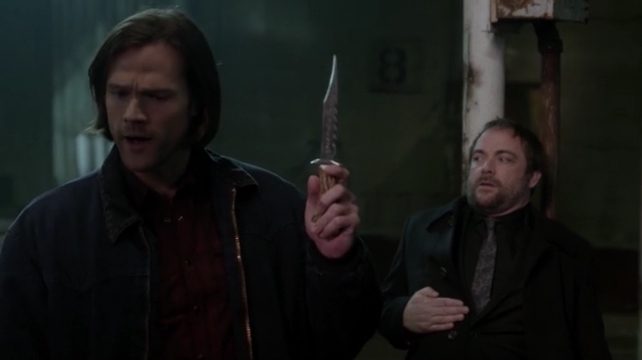
Instead, he is labeled as a monster. Sam won’t allow his attempts to be good sway him from his goal. If he must kill Crowley to save his brother and appease the witch holding the key to that cure, he’ll do it. It’s not the action that has bothered Crowley, however. It’s the words and the person Sam has partnered with that does. Crowley’s prison has been that drive to be more human. It has been that drive to feel something, to be considered worthy of more than being the evil King of Hell, and to be accepted in some strange way within the Winchester family on some level. He’s been through so much with them through the years. He helped them stop the Apocalypse. He’s helped them face down the Leviathans—even if in the end he profited from their ultimate suffering and separation. Crowley also helped them with Abaddon, another mutual enemy, and while that created a new problem encapsulated in the Mark and Dean’s transformation after his death, Crowley also tried to help that, too. He’s seen himself as more on their side than against them, deciding to ignore the things like killing Sarah or the others they’ve saved through the years. He’s chosen to focus on the times he’s helped, feeling he’s earned a spot his mother has now usurped with at least one brother.
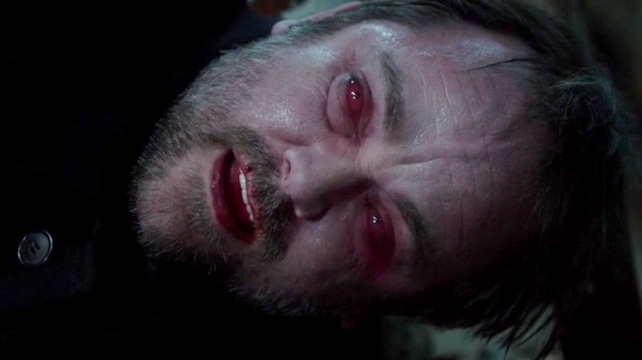
Instead of being embraced by Sam after everything they endured together in that church, Sam is rejecting him outright. It is this rejection that grants Crowley the wish to feel something. It connects the prison he’s built for himself—being better or doing more good than harm—to “even when it hurts.” For Crowley, he sees the brothers as a strange extension of his family, and to be rejected by it stabs deeply inside him to make him feel again. In return, Crowley shows that he’s not as weakened as he once was by the human blood he’d taken during the near cure or the addiction he nursed last year. He’s beyond that, fully demonic once more, and upon the deep wound cutting into him decides to rise from his prone state, refusing to cough up the rest of his demonic self onto the floor. He tells Sam, “You’re right I am a monster, and I’ve done bad, I’ve done thing you can’t even imagine. Horrible, evil, messy things. And I’ve loved every damn minute. So thank you Sam, for reminding me who I really am.” The moment he turns his head towards Sam, flashing his dark blood eyes, Crowley breaks free from his prison, allowing the stab of a family member hurting him to fuel his rage. If Sam sees him as a monster, then a monster he shall be.
If Crowley has chosen to be a better person now to break free and become monster, how does that juxtapose with Castiel?
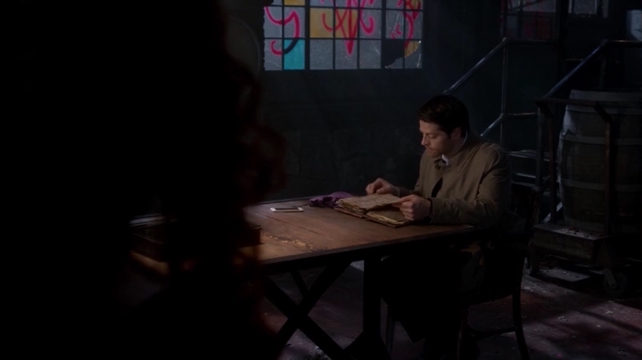
The angel is trapped in his own prison of his own making, too. Much like Crowley, he’s been left to deal with his experiences of humanity, of longing for that feeling again, and siding more and more with them over his angelic family. As they have rejected him—he’s no longer allowed to go to Heaven after all—he will reject them in kind. After all, in his view, the Winchesters have been there for him far more than the angelic family ever has—especially when it hurts or when he didn’t seem to want them there anymore. His prison, therefore, is being caught in the in between. He’s no longer able to call himself angel—full grace or not—nor is he human. It irks him that Rowena points this out to him, amused that she is confronted by an angel that doesn’t seem to accept a divine role. She tells him, “I’m sorry, you’re just fascinating, an angel that rejected Heaven. That’s like a fish that wants to fly or a dog that thinks it’s people.”
Castiel shies away from this statement, his pride somewhat wounded. It leads him to retort, “Well, I’m a lot like people.”
Castiel can’t really straddle both worlds, however. He has decidedly chosen to be with the Winchesters no matter what. Even when Sam comes to tell him without naming the fate that Charlie endured, Castiel is ready and willing to stand with his human brother. He protests slightly about Sam continuing on despite Dean’s objections—but immediately agrees to do whatever he can to help the elder Winchester anyways. If that means trailing him down to the Styne estate and finding him, the angel will do it. He has cast his lots with them, and he is determined to help them through to the end of this situation no matter what.
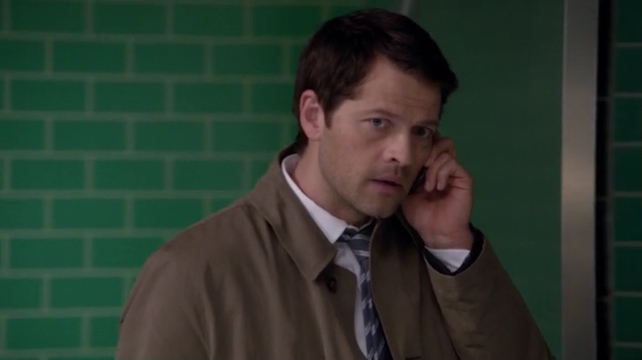
Upon finding the slaughtered Stynes, Castiel knows that he is too late. Dean has succumbed on some level, and each member of the Styne family wasn’t merely killed, they were brutally slaughtered, evidence that perhaps Dean enjoyed this too much. Castiel’s expressions of horror and revulsion capture his fear and anxiety well. He knows time is running out for them faster than ever. Castiel must find Dean fast and confront him, buy them time to wring the cure from Rowena, and perhaps save Dean before it is too late for him and he becomes the next Cain.
Castiel’s prison of straddling the two worlds comes to a head when he finds Dean back at the Bunker, the remaining Stynes ransacking the place brutally murdered. He doesn’t want to hurt Dean—and he knows that he possibly can being a full angel again. He doesn’t want to inflict damage or will upon the elder Winchester as he might have ages ago when he first took the brothers into his charge. He wants Dean to see what is before him, that they are here for Dean no matter what—especially “even when it hurts.” And yet, the decision to side more with his humanity side, the decision to hold back imprisons him again. He is at Dean’s mercy, taking huge blows and strikes.
He tells the elder Winchester that he can’t let Dean do this to himself because he knows who will have to watch in horror. It is the angelic side of his existence imprisoning him here. Unlike Sam or whomever else they adopt into their family, Castiel won’t die of old age. As long as Dean has the Mark, he, too, will never die. He pleads with Dean to let them get the Book translated, to try this cure, to fight back against the darkness the Mark has wrought. He tells him, “Maybe you could fight the Mark for years, maybe centuries like Cain did. But you cannot fight it forever, and when you finally turn, and you will turn. Sam and everyone you know, everyone you love they could all be long dead. Everyone except me. I’m the one who’ll have to watch you murder the world, so if there is even a small chance that we can save you I won’t let you walk out of this room.” It is one prison he refuses to stand by and let be built. So he tries to sway Dean, even through the beating to see if he can convince Dean they are not going to abandon him.
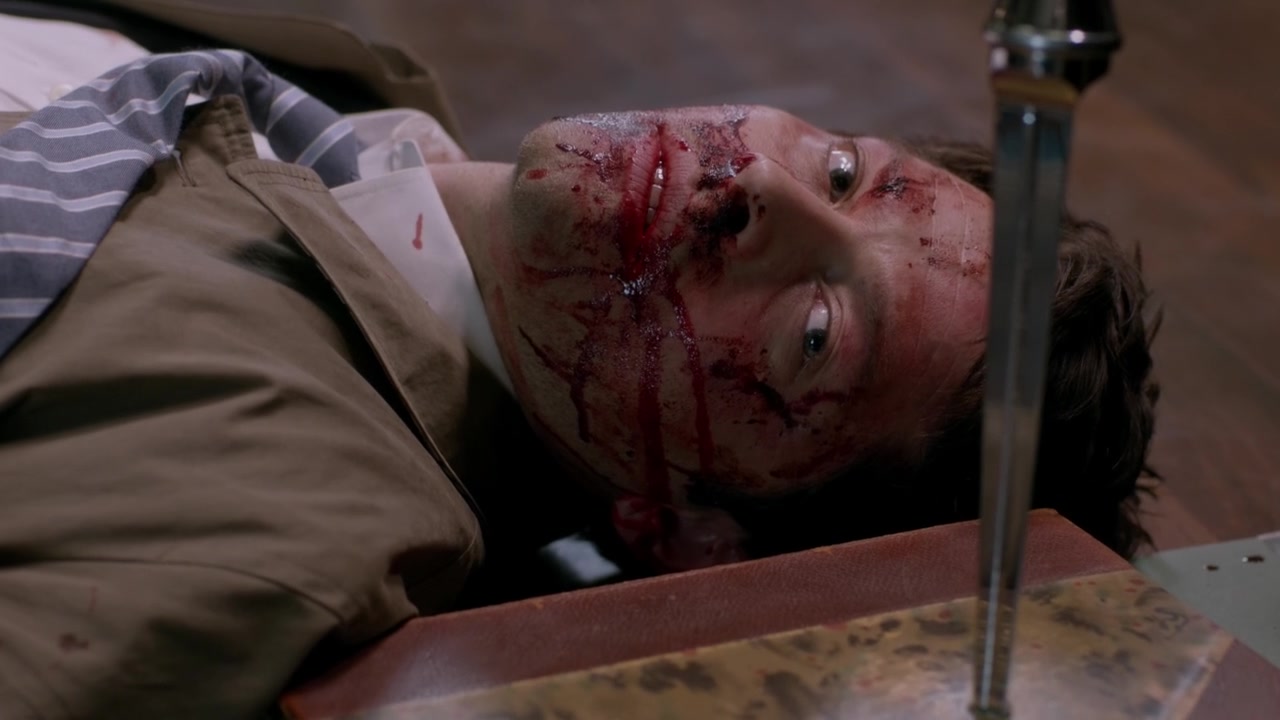
It fails, and Castiel is left a bloody pulp in the Bunker, his blade shoved harshly into the book next to his head, showing just how close standing by Dean “even when it hurts” nearly cost him.
Dean’s prisons are both being built and broken throughout “The Prisoner.” On one hand, the real Dean Winchester is being bricked up inside a prison of the Mark of Cain’s making and on the other the Mark of Cain is breaking out of the prison the real Dean has created for it throughout the season. It is all due to the prison his grief and anger first build, crumbling the well honed defenses he’s made to keep the Mark at bay all this time. He is reeling in pain and anger from what happened to Charlie and the secrecy of Sam’s plan. All the rigid control he’s been holding onto evaporates little by little until nearly none of it remains.
The first breaking of the Mark’s prison and the building of the real Dean’s comes right at Charlie’s funeral. Silently and with grieved purpose, both brothers prepare the hunter’s funeral pyre for their fallen “sister.” As they hoist her wrapped body onto it, Dean lingers a moment, reverently touching her and showing a moment of tenderness. It would be the last such moment he’d share for the remainder of “The Prisoner.”
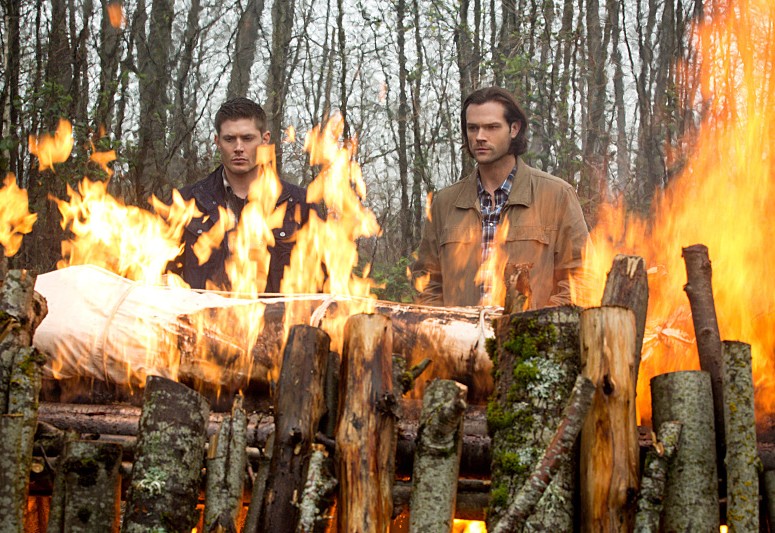
As they stand by the burning fire, mourning her loss, Sam speaks up about how he felt about Charlie, about how she was the best—and then he starts to say “I’m sorry.” In that moment, Dean’s anger and grief collide, causing him to retaliate against his brother. He tells him, “You wanna know what I think? I think it should be you up there and not her. This thing with Cas and the book ends now. Shut it down before somebody else gets hurt, you understand me?” It is a vicious and inexcusable thing to say—and it is the very moment the Mark sees its chance to break free. Anger and grief at the loss of Charlie was enough to weaken Dean—but turning that towards his brother even in a display of cruel words gave it the perfect fuel it needed. After all, the Mark of Cain was created in a moment of fratricide. Anger at another’s sibling would please it and strengthen it in ways no other emotional feeling ever could.
He further goes onto say that he’s going to find who ever did this and destroy everything they loved. When Sam asks, “Is that you talking or the Mark?” Dean simply retorts, “Does it matter?” In that single instant, Dean has chosen to fall into the Mark’s hands, allowing it to begin the construction upon his prison, bricking him inside its evil and dark corner—the one it has been forced into for months. It will take his grief and anger prison built upon his loss of Charlie and amplify it so he will do as it wishes—to go on a rampage and to exact evil upon all of the Stynes. Evil as the family may be, the ruthless manner in which Dean goes after them is more than simply avenging a fallen family member or a hunt to stomp out a threatening monster.
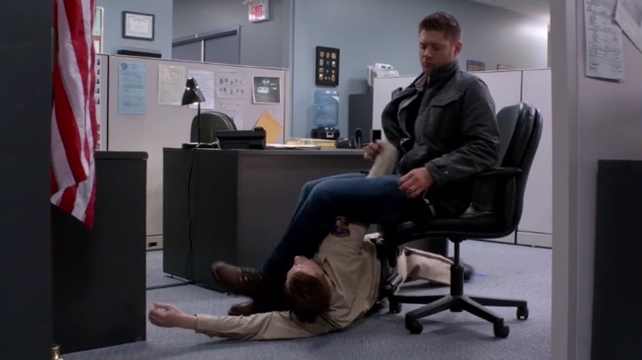
Dean makes his way towards Louisiana, and as he is on his way to the Styne estate, he is pulled over by the sheriff. Even if he’s being bricked up by the Mark and the Mark is breaking out of its own prison, we see Dean hold back here. He doesn’t get the chance to viscously beat or kill these cops—even when they start to smash on his car. Instead, he allows them to take him into custody, and while there he becomes calculating and cold, impatient to get back to his mission and not wanting to take blood out of these men when there’s blood to be had at the Styne home. Dean cruelly manages to wrestle the deputy to the floor, obviously breaking his arm and getting the keys to get out of his chains and make his way to the Stynes with a deadly grace.
Efficiently, he moves through the house and finds each Styne on guard, killing them without pomp or circumstance. Dean is embracing the killer the Mark is shaping him to be here, and he is more than eager to wipe this branch of the Stynes off the map. Even so, the physical prison element of the episode rears its head again when he is caught and the same terrible tactic of pulling a plastic bag over his head as the boy at the school is deployed. As Dean awakes, he is restrained yet again, held down onto the operating table to be sliced and harvested for the Styne Family purpose. They are gleeful as they have him where they want him. Safe from any of his further violence—or so they think—they can take their time figuring out what they want to keep and what they want to toss.
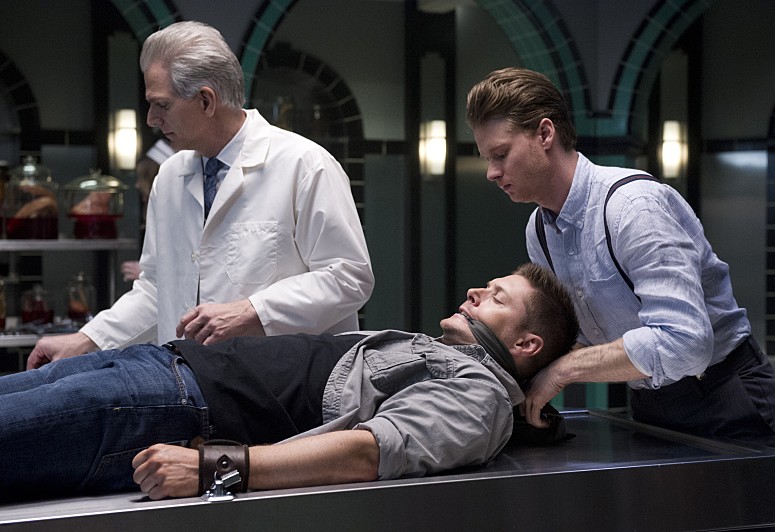
Dean, not even the least bit nervous, tells them not to do this. Taken as for begging by Monroe Styne, he’s told “We’re already past the bargaining stage, son.” Dean further explains that they cannot “flat line” him. If they do, he comes back a demon. He can never die. Instead of being put off by this revelation, Monroe is more eager than ever to use him as the “perfect lab rat.”
The Mark may have been bricking Dean into a prison of its own design, but he was still able to find some means of fighting back enough to desire one thing. It doesn’t mean that he won’t continue his slaughtering of them, however, but Dean tells them coldly, “No, but I will be human. So maybe a few of you live. Maybe.” Somehow, even after all the giving into the Mark’s cruel purpose, after it has slowly imprisoned Dean with his own grief and anger and its own dark power, the real Dean still has a desire to remain human.
But he also sees this Mark as more than a simple means to an end, too. In his fight against Abaddon, Dean only saw it as such. It was his method to remove her from the board, to take down a threat to them all. Instead, he is now seeing it here as the gift the Stynes keep calling it. It’s not just that curse that has been inflicted upon him. It can give him power, strength, and the ability to kill anyone and everyone that gets in his path. Just as Monroe is preparing to slice into his torso, Dean uses that new found strength and snaps his bonds, breaking free from the physical prison while the Mark puts yet another brick up in the prison it builds inside of him.
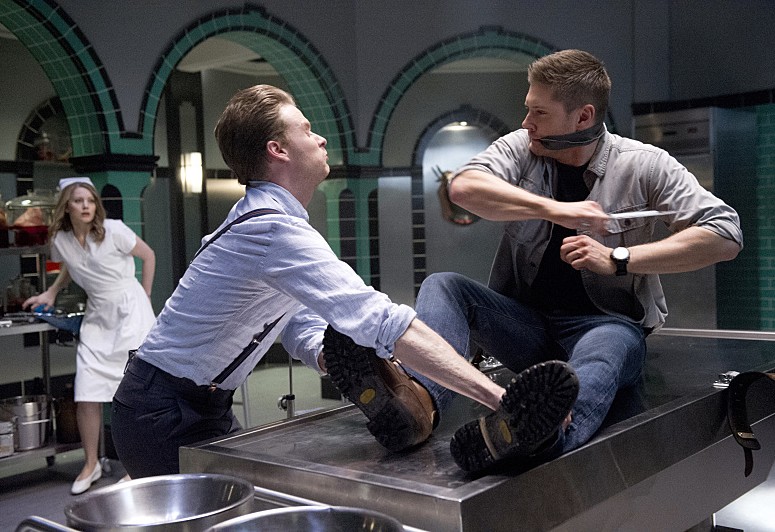
What follows is a brutal dance of death, one that leaves no Styne member alive. Monroe is viciously beat into a freezer door and then his neck is snapped by Dean’s bare hands. He stabs and shoots the rest, easily overpowering and outrunning each and every one that tries to get away. These people were responsible for Charlie’s death—and so he removed them from the face of the Earth as viciously as possible, his very grief fueling the Mark’s terrible lust for blood and power all the more.
Upon returning to the Bunker to find that even this has been invaded by the Stynes, including the very one that killed Charlie, Dean is even more brutal and cold, unwavering in his sense of revenge and anger. Eldon is there, starting to taunt him about how he killed Charlie. Dean will not stand to hear it, and points out one flaw the Stynes have never caught onto. He tells him, “Your old man’s dead… They’re all dead. So you can save me the speech on the three hearts, the two spleens, the seven nipples for the ladies, or the fellas; I don’t judge. But even with all that, you still only have one brain.” Eldon, not fast enough to realize what that means, ends up dead on the floor, bullet to the head.
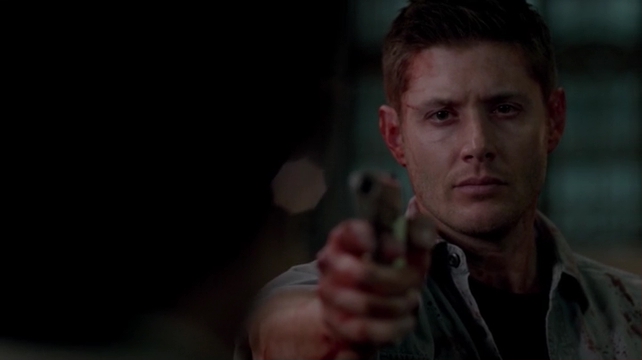
It only leaves Cyrus, the unwilling Styne, and he begs hopelessly against Dean. Dean tells him, talking more about himself than this young man, “Oh, you are like them. There’s bad in you. It’s in your blood. Now you can deny it, you can run from it all you want, but that bad will always win.” Imprisoned completely with in the Mark’s new construct, the Mark takes full freedom here and Dean pulls the trigger, shooting the boy just as he had his cousin.
It is here that Castiel confronts him, bringing the “even when it hurts” element to the discussion. He tells Dean that they’re trying to save him, that they’re not going to stand by and let this happen to him. Castiel refuses to be the one that watches him “murder the world” and in return Dean lets loose his anger at his family, so hurt by what they did in secret, so driven by the grief that he felt in the aftermath of what happened with Charlie. Dean unleashes it in full force, allowing the Mark to reign free and beat his friend ruthlessly. He tosses Castiel around, kicking and punching and hurling hateful words. Dean will not and chooses not to let them be there for him—and as he has Castiel on the floor, vulnerable and so close to being killed by his own blade, Dean pulls back to drive the blade into the book by his head.
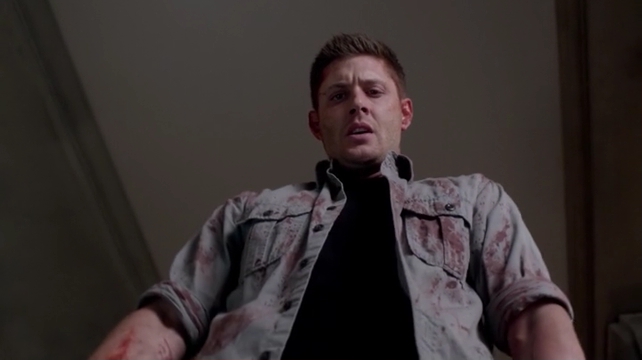
Over his shoulder, Dean hurls his worst, showing his outright rejection of his family. He tells the bloodied angel, “You and Sam stay the hell away from me, the next time I won’t miss.”
It is this statement that seems to seal the real Dean into the Mark’s prison—after all, he’s promising death the next time they try to intervene. Either one could face the brutality he exhibited here, and that time he won’t stop just short. He will start murdering them—he will act out Cain’s dark prophecy—and the Mark will see that it is done.
But Sam isn’t idle during all of this either. His prison is grief and desperation, and as the two forces battle within him, we see him struggle to come to grips with what he feels he must do to prevent the Mark from locking Dean away forever.
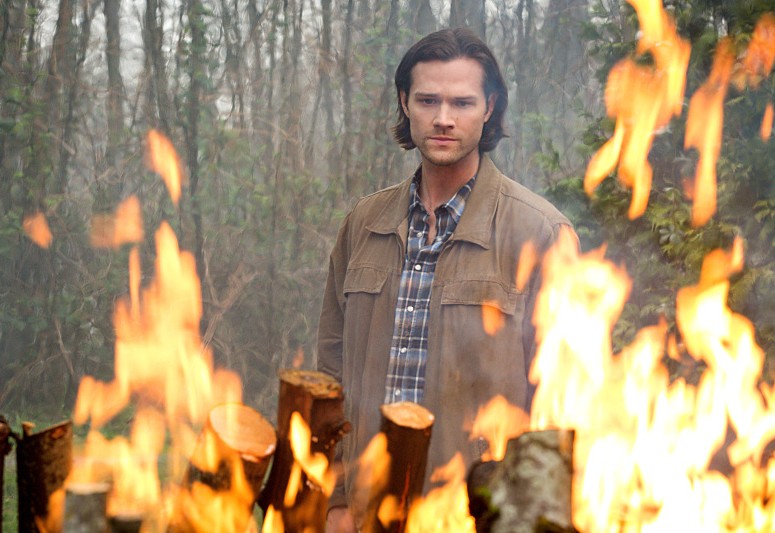
As they prepare Charlie’s funeral, we see Sam’s utter grief etched across his features. He’s despondent as he chops the wood, as they stand by the fire—and as he starts to verbalize his goodbyes, his shaky voice exudes a struggle to grasp words to express how this latest loss makes him feel. When Dean hurls the vicious words his direction, we see Sam crumble within himself, absorbing the hit and not fighting back. On some level, his grief and guilt allow him to take Dean’s words as his own—that his brother is only verbalizing what he, too, sees in himself. He must feel that it is his fault—even though that is not the case and hasn’t been since the Stynes started to track Charlie.
As Dean stalks away from him and we see him return to Castiel and Rowena, we see Sam verbalize the same sentiment as his brother. Castiel asks what happened to Charlie, and he simply says in one heartbreaking syllable, “Me.” The price he’s paid to cure his brother is too high and he is now here to follow through on his brother’s demand to stop. His grief and guilt won’t let him out of that prison too easily to keep going and he feels too much responsibility for what happened to her to do more.
Rationally, without the emotional prison of his guilt, Sam would be able to see that the Stynes were going to go after Charlie no matter what. He had asked her to find the Book of the Damned, and she had. The moment they chased her back to America they were going to hunt her down no matter what or who had the Book by that time. No place would truly be safe, either. The Stynes don’t leave witnesses and they do not like those who thwart them. Considering their break into the Bunker, not even there would have been refuge enough. But Sam is not thinking this way, not realizing that had he left her alone away from his secret plot or not, that they were going to go after her anyways. Instead, he’s thinking of how this could have been different, how he is to blame, and how he must now do as Dean demands to at least make an attempt to fix things.
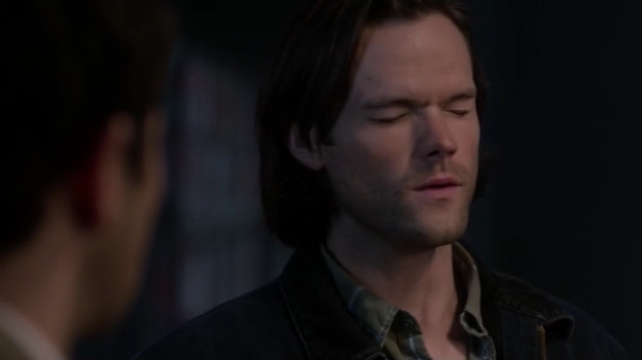
That is until he gets Charlie’s email. He hesitates, his indecision marking his body language as he wavers between giving up or continuing on. Part of him knows that going forward is dangerous and could make it worse, but not going to see it through would also be a disservice to Charlie and her sacrifice. Sam can’t stand by and let what she died sending to him go by and be wasted. And so, he shoves his phone into the witch’s face, demanding to know if she could read the Book now.
Castiel is taken aback by Sam’s about face, knowing that the younger Winchester was determined to stop in the wake of these recent events. Sam’s prison of grief trades places in that instant with his prison of desperation. He tells Castiel, his voice breaking with raw and painful emotion, “Yes. I mean, it’s become his thing. I owe him this. I owe him everything. Look, I know he pretends that he can ride the Mark out, but you and I know the truth. You know what happens if we don’t cure him. We both know where that road ends.”
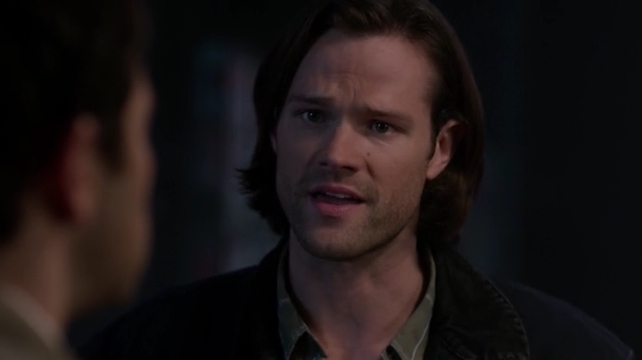
Sam knows that his brother has stood by him no matter what in the past— “even when it hurts”—and while he has had violent disagreement with that practice in the past, faced with the same terrible decision of watching his brother be destroyed forever, Sam chooses to do the same. He will not allow Dean to be bricked inside his own body, taken over by this possessive force known as the Mark. He told his brother, “Maybe not, but… when it’s done with you, you won’t be you anymore.” In many regards, Sam’s desperation prison has lead him to do this because he has been exactly where Dean has been—losing a battle to something evil inside. He knows what it is like to have something possess and corrupt, and he knows that the last thing he’d ever want anyone else to ever endure is that very same fate. His brother didn’t hesitate to fight for him—Dean’s desperation prison wouldn’t let him let it go—and now Sam is facing the same demon and making the same choice to keep fighting.
This leaves him vulnerable to his prisoner, Rowena. She may be in chains, banned from magic use to its iron, but she is still able to twist her captor into knots and exact demands in return for her assistance. The witch may want the Mark off of Dean’s arm to protect herself, but she won’t do it for free. Her price is that he kill Crowley, and if he doesn’t do that first she won’t give him the cure. Sam, forced again by his desperation, decides to follow through on his end, tricking Crowley into a meeting with Dean and then facing the King of Hell down.
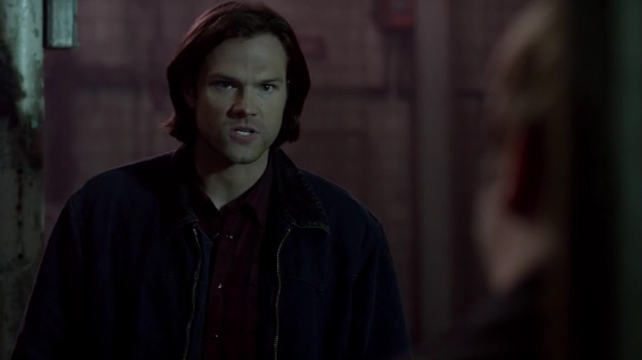
And yet, things don’t go according to plan. Sam wanted Crowley dead—and has since they’ve met him for all intents and purposes. But when it comes to this confrontation, he’s hesitant. Not because he necessarily cares deeply for Crowley or is questioning if he should, but because in a weird sense this demon has become a strange extension of their family—after all Crowley’s actions and words cut Sam deeply as only family can do—and Sam is determined that the King of Hell feel his own pain in return. He shouts at Crowley, “It doesn’t matter. You know, maybe everybody else has forgot about the bad you’ve done, but I haven’t. I have watched you kill people Crowley, innocent people, people I cared about, people I loved. So yeah, you got the accent and the suit and the snark, but at the end of it, you are a monster just like the rest of them. And I’m going to watch you die screaming just like the rest of them.”
If Sam hadn’t been hurt on some level by Crowley’s actions—getting the Mark on Dean in the first place, cavorting around with Dean while he was demonic, and then foisting Dean on him to clean up the mess—it’s likely that Sam would have simply shot Crowley and stabbed him with no fuss or muss. Instead, his desperation to hurt Crowley first because a twisted and intricate relationship has developed over the years between the Winchesters and the King, and second because he wants Crowley to feel every wound he does deeply, it leaves the door open for Crowley to fight back. Couple that with Rowena’s demand that Sam deploy her methods, and it is a set up for what happens next. Crowley not only stands up, removing the Devil’s Trap bullet to stand over a shocked Sam, he unleashes his power. A mere snap of his fingers is all it will take to kill Sam. He tells him, “From here on, I want you to know that the only reason you’re alive is because I allowed it.”
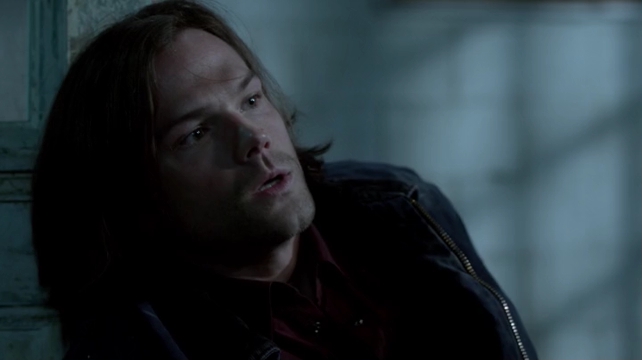
Sam is left stunned, knowing that not only has he lost his chance to get Rowena to read the Book on his behalf, but he has also re-created an enemy in Crowley, one that may very well try and interfere further with his attempt to save Dean.
Sam calls the witch, despondent, angry, and agitated. He tells her that her little hex bag didn’t work, that “Crowley set it on fire,” and that he doesn’t know if he can hold his end of the deal up now. After all, Crowley won’t fall for the same trick twice. Even if he should try again, it’s also clear that Crowley won’t let Sam walk away twice, either.
And yet, that’s not the only issue on Sam’s plate. He’s called by Castiel to learn of the slaughter Dean exacted at the Styne estate—and then he’s told chilling news that Dean is now on his way home. He rushes on his way there, not wanting to leave Castiel alone with his brother if possible. He wants to be there for Dean, no matter what prisons they’re both being put into or breaking out of—and he won’t stand by if there’s a chance he can reach the real Dean trapped inside.
After all, the Mark of Cain isn’t just Dean’s prison—it’s Sam’s, too.


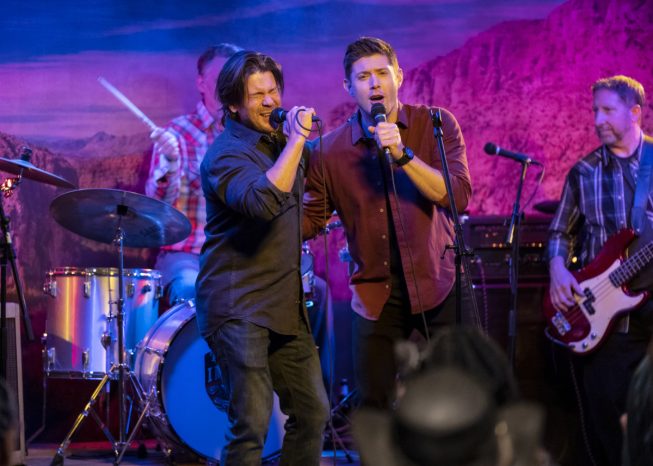
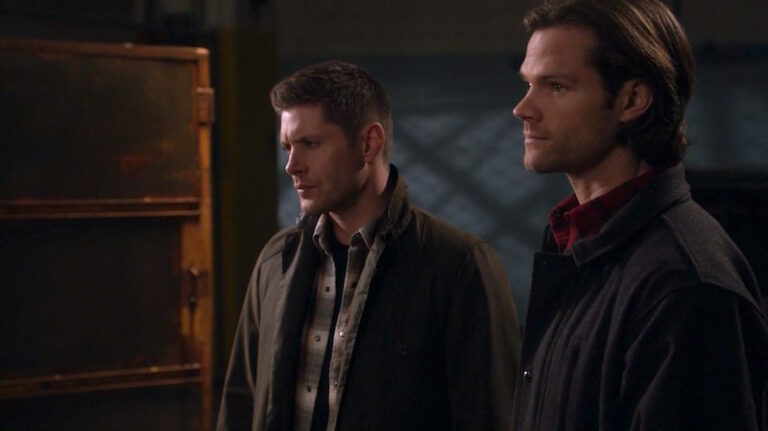
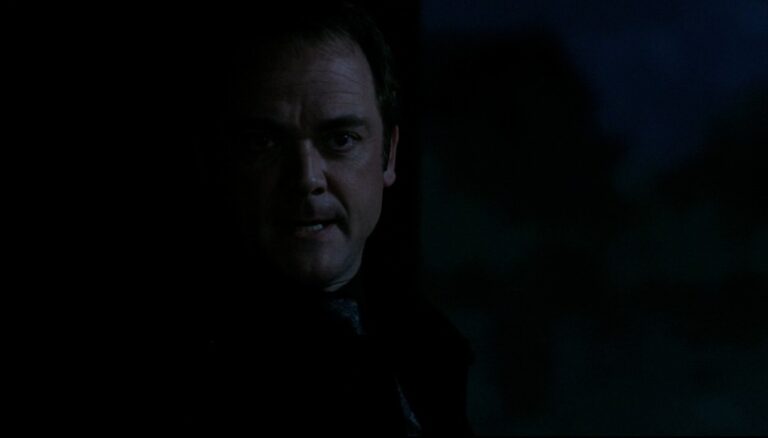
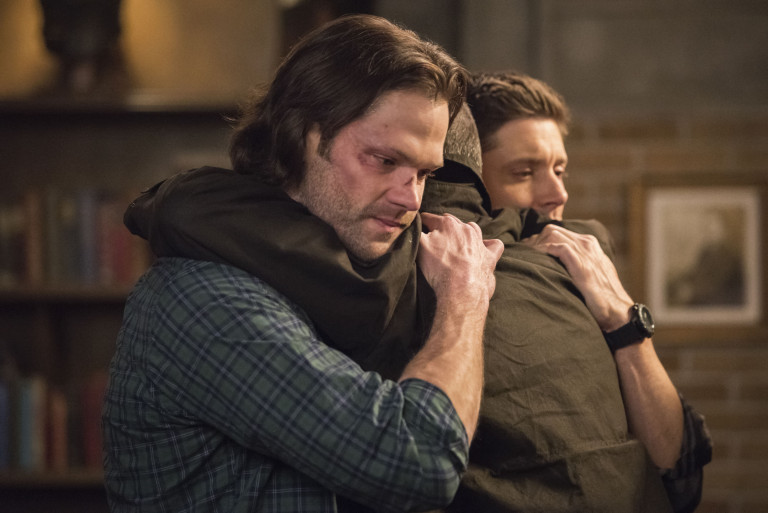
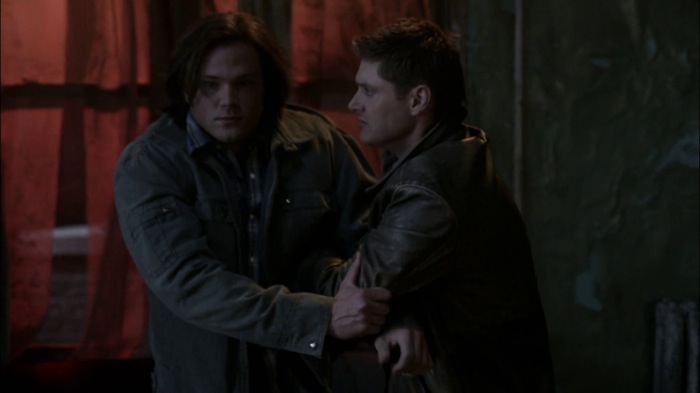
Leave a Reply